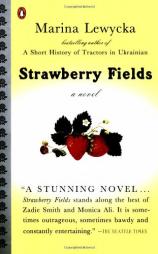Reading Group Guide
Discussion Questions
Strawberry Fields

1. Each of the characters in Strawberry Fields has a very distinctive voice. All of the characters’ stories are intertwined, but they each develop separately. How does the fact that each character’s story and voice unfolds independently affect the narrative of the novel as a whole? Does it make it easier or harder to understand how the characters relate to each other?
2. Andriy and Irina are both Ukrainian, but they are clearly from different sides of the tracks. At the beginning of the novel, Irina looks down on Andriy, and Andriy thinks of Irina as stuck-up. But as the story progresses, they grow to appreciate and even love each other. How did you react to their blooming romantic relationship? Do you think their adventures together allow them to put aside their differences, or did they create an artificial closeness?
3. All of the workers on Leapish’s farm are migrant seasonal laborers, but none of them seem to know exactly what they have gotten themselves into. Was this initial setup believable? Did the following events make the story more or less plausible?
4. Vitaly is a strange character --- first he seems to be one of the Leapish crew, but then he seems to turn against them, becoming a “mobilfonman.” He coerces many of his less savvy friends into bad jobs in worse conditions. And yet, as we find out something about Vitaly’s life, we learn that he has been just as much a victim of the system as those he is taking advantage of. Did you sympathize with Vitaly? Do you think he could have helped his behavior? How would you have acted in his situation?
5. In the novel’s epigraph, Lewycka quotes Chaucer: “For myn entente is nat but for to pleye.” The tone of the book is indeed lighthearted, but Lewycka brings up some very serious social and political issues. Does her political stance come across strongly? How did some of the situations she presents in the novel change your mind about real-world politics?
6. Like many novels, Strawberry Fields is about a journey. In what ways do the real journeys the characters take --- from their native lands to Leapish’s farm, to various parts of Europe, and sometimes back home --- stand in for their emotional or psychological journeys?
7. Vulk is obsessed with “making possibility” with Irina. He is a frightening and revolting character, but he seems to have a genuine crush on Irina. Because of this, is he a sympathetic figure? What are some of the characteristics that would elevate him from the position of merely “bad guy”?
8. One of the stranger episodes in the novel occurs when Emanuel, Irina, Andriy, and Dog show up on Toby Mackenzie’s doorstep. Toby’s family seems stereotypical --- an overbearing father, a repressed but kind mother, and a rebellious, drug-using teenage son. Was the author’s description of the family funny, upsetting, or a combination of both? What about the immigrants’ reactions to the family? In what ways was the scene realistic?
9. Discuss Emanuel’s and Marta’s religious convictions. Do their religious beliefs make them harder or easier to understand? Why do you think the author chose to include two devout Catholics from such different backgrounds?
10. Do you think the subject matter of the book works best as a novel? Would it have been more powerful as non-fiction --- for example, an exposé of immigrant life?
11. What did you think of the characters’ reactions to Western culture? Were their impressions accurate?
12. Which character did you relate to best and why? Was there any character you disliked? Did the story have a clear hero? A villain?
Strawberry Fields
- Publication Date: April 29, 2008
- Paperback: 320 pages
- Publisher: Penguin (Non-Classics)
- ISBN-10: 0143113550
- ISBN-13: 9780143113553







